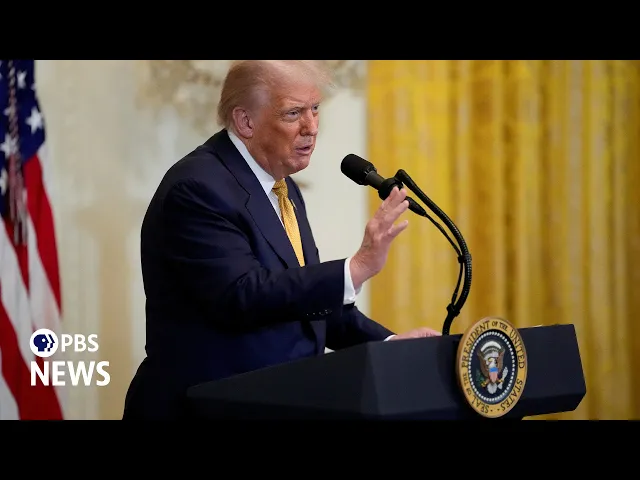WATCH LIVE: Trump reveals ‘AI Action Plan’ shaped by his tech supporters after revoking Biden policy

Trump's AI vision raises tech policy questions
Donald Trump's recent unveiling of his "AI Action Plan" marks a significant pivot in the technological policy landscape as the 2024 election approaches. Standing before supporters and tech industry figures, the former president outlined his vision for artificial intelligence in America—one that emphasizes deregulation, competition with China, and a fundamental reshaping of Biden-era AI policies. The contrast between the two administrations' approaches couldn't be more stark, setting up AI governance as a key battleground in the upcoming electoral contest.
Key observations from Trump's AI announcement:
-
Trump's plan centers on eliminating what he characterizes as "excessive" AI regulations instituted by the Biden administration, positioning deregulation as key to American technological competitiveness.
-
There's a strong emphasis on competing with China, with Trump framing AI development as a critical national security issue rather than primarily focusing on safety considerations.
-
The approach reflects significant input from Silicon Valley supporters including David Sacks and Elon Musk, suggesting closer alignment with certain tech industry interests than Biden's more regulatory stance.
The deregulation gambit
The most striking element of Trump's AI approach is the wholesale rejection of the Biden administration's regulatory framework. While the current administration has focused on implementing guardrails through executive orders and agency guidelines, Trump's proposal advocates removing these constraints, arguing they hamper innovation and economic growth.
This perspective aligns with traditional Republican approaches to governance but raises legitimate questions about balancing innovation with responsible deployment. The tech industry itself remains divided—some executives welcome reduced regulatory burden, while others acknowledge that some form of governance framework provides certainty and helps maintain public trust. What's clear is that the pendulum of AI policy could swing dramatically depending on November's outcome.
"When governments try to regulate something they don't understand, they typically do more harm than good," said one tech executive at the event, reflecting the sentiment among Trump's Silicon Valley backers.
The geopolitical AI race
Trump's framing of AI development as fundamentally a competition with China represents a continuation of his first-term approach to US-China relations but applied specifically to emerging technologies. This national security lens certainly has merit—China has made artificial intelligence a cornerstone of its technological strategy with significant state backing.
However, this emphasis potentially oversimplifies the complex interplay between competition
Recent Videos
How To Earn MONEY With Images (No Bullsh*t)
Smart earnings from your image collection In today's digital economy, passive income streams have become increasingly accessible to creators with various skill sets. A recent YouTube video cuts through the hype to explore legitimate ways photographers, designers, and even casual smartphone users can monetize their image collections. The strategies outlined don't rely on unrealistic promises or complicated schemes—instead, they focus on established marketplaces with proven revenue potential for image creators. Key Points Stock photography platforms like Shutterstock, Adobe Stock, and Getty Images remain viable income sources when you understand their specific requirements and optimize your submissions accordingly. Specialized marketplaces focusing...
Oct 3, 2025New SHAPE SHIFTING AI Robot Is Freaking People Out
Liquid robots will change everything In the quiet labs of Carnegie Mellon University, scientists have created something that feels plucked from science fiction—a magnetic slime robot that can transform between liquid and solid states, slipping through tight spaces before reassembling on the other side. This technology, showcased in a recent YouTube video, represents a significant leap beyond traditional robotics into a realm where machines mimic not just animal movements, but their fundamental physical properties. While the internet might be buzzing with dystopian concerns about "shape-shifting terminators," the reality offers far more promising applications that could revolutionize medicine, rescue operations, and...
Oct 3, 2025How To Do Homeless AI Tiktok Trend (Tiktok Homeless AI Tutorial)
AI homeless trend raises ethical concerns In an era where social media trends evolve faster than we can comprehend them, TikTok's "homeless AI" trend has sparked both creative engagement and serious ethical questions. The trend, which involves using AI to transform ordinary photos into images depicting homelessness, has rapidly gained traction across the platform, with creators eagerly jumping on board to showcase their digital transformations. While the technical process is relatively straightforward, the implications of digitally "becoming homeless" for entertainment deserve careful consideration. The video tutorial provides a step-by-step guide on creating these AI-generated images, explaining how users can transform...
